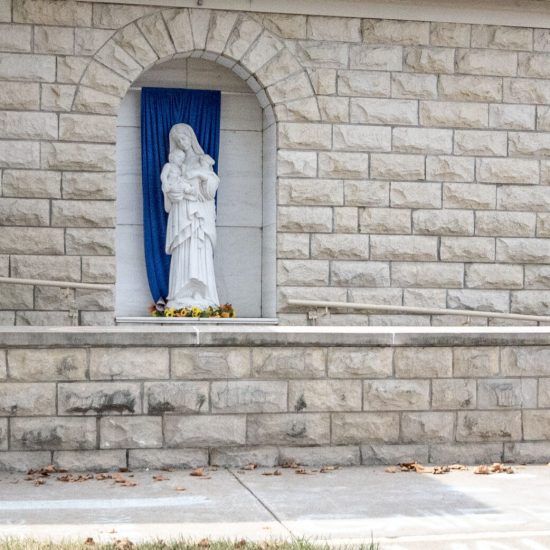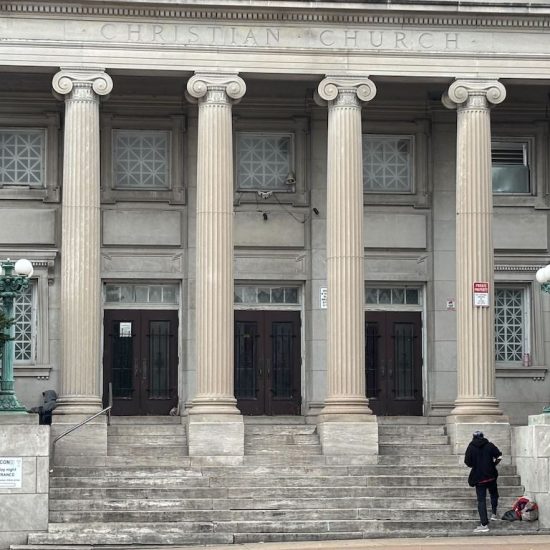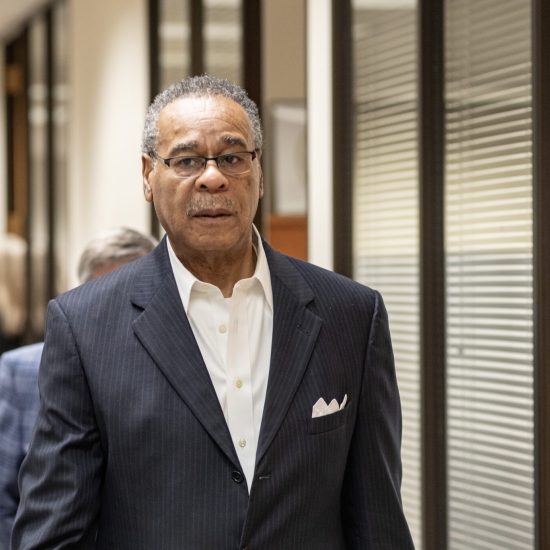By Bill Webb
Word&Way Editor
Eleven ministers who supported taking control of the Missouri Baptist Convention a few years ago now say that those currently in power have become too narrow and legalistic and that the convention needs to be wrested from their control.
They have identified Project 1000 architect Roger Moran, his Missouri Baptist Laymen’s Association and others as being most responsible for tightly controlling MBC representation and excluding qualified “conservatives” from trustee service. Project 1000 was the plan to recruit messengers to effect the takeover.
They also have expressed dissatisfaction with the MBC nominating committee, Executive Board and its newspaper, The Pathway.
The group voiced its concerns publicly in a “Save Our Convention” information session May 15 at First Baptist Church of Harvester in St. Charles, attended by an estimated 175 people.
Organizers urged attendees to get out the vote at the MBC’s annual meeting Oct. 29-31 at the Tan-Tar-A resort at Osage Beach to bring about needed changes.
The ministers who organized the campaign and the St. Louis-area gathering were:
• John Marshall, pastor, Second Baptist Church, Springfield;
• Mitch Jackson, pastor, Miner Church;
• Jim Breeden, director of missions, St. Louis Metro Baptist Association;
• Dwight Blankenship, pastor, Parkway Church, St. Louis;
• Kenny Qualls, pastor, First Church, Arnold;
• Wes Hammond, pastor, First Church, Paris;
• Tom Willoughby, pastor, First Church, Eldorado Springs;
• David McAlpin, pastor, First Church, Harvester;
• David Sheppard, pastor, First Church, St. Charles;
• Wayne Isgriggs, pastor, First Church, Lincoln; and
• Lee Sanders, minister of education, First Church, O’Fallon.
They are urging others who are concerned about the convention’s direction and it’s current elected leadership to:
• Submit names to the MBC nominating committee for nominees to the Executive Board and other institutional boards, giving priority to people who come from churches that are strong Cooperative Program supporters and who are “conservative but not legalistic” and endorse the Southern Baptist Convention doctrinal state, the Baptist Faith and Message 2000.
• Elect a new slate of state convention officers, including president, first and second vice presidents, and recording secretary. During the past several years, successful nominees for state office have been endorsed by Moran and other key leaders.
• Vote in October to (1) reject the nominating committee’s report to MBC messengers “if it is not reflective of people who represent the MBC as a whole” and, if necessary, (2) adopt a substitute slate.
Bruce McCoy, who is the convention’s first vice president and chairman of the nominating committee — succeeding Moran himself in the latter role — spoke at the event and pledged that if the committee’s report to messengers this fall fails to show greater inclusiveness, he will personally present a minority report.
• Vote to reject the convention president’s nominations of nine people to the nominating committee itself “if those nominations are powerbrokers and do not reflect the MBC as a whole.”
“If we do these…things, it will immediately bring the convention back…,” David Sheppard predicted.
Getting out the vote
The group is taking a page from the Project 1000 playbook to achieve its goals.
Sheppard said the 11 hoped to attract the equivalent of 10 people apiece to the informational meeting, a goal they appeared to meet. By working with members of the state directors of missions fellowship and others, they hope that 110 will increase tenfold so that at least 1,100 messengers will show up at Tan-Tar-A ready to vote their agenda.
He said the concerns of the 11 have nothing to do with Calvinism, alcohol use, the emerging church movement or even the recent firing of MBC executive director David Clippard, all recent topics of discussion among Missouri Baptists.
Sheppard referred to a four-page handout that identified two primary concerns.
The first is the “continued power control of certain Project 1000 leaders and the Missouri Baptist Laymen’s Association that has led to the micro-management of the Missouri Baptist Convention staff and the exclusion of many fine Missouri Baptists.” The laymen’s association is made up of Moran and four others and purports to identify and rid out liberalism from Missouri Baptist life.
The second concern is the “spirit of legalism that refuses to cooperate with those who are not in total agreement and sets parameters that exceed the Baptist Faith and Message.
“We are concerned that these two forces — a political powerbroker machine and a spirit of legalism — will lead to the destruction of the Missouri Baptist Convention and more specifically Southwest Baptist University and Hannibal-LaGrange College,” the handout summarized.
Sheppard said that many pastors and churches in the state are frustrated and are ready to walk away from the MBC because of “things happening in the convention.”
“All in the family”
Sheppard used two phrases to describe what he believes has happened in recent years. “One is ‘musical chairs,’” he said, with the same people being tapped over and over whenever there are trustee openings.
The other is “all in the family,” he added, charging that a year ago, when Moran was chairman of the MBC nominating committee, he unsuccessfully tried to have his wife nominated to the Executive Board but was successful in “placing” his first cousin and brother-in-law — Ron Turnbull and Jason Rogers respectively — on the powerful board.
“As chairman of the nominating committee, he [Moran] got two family members nominated,” Sheppard said.
He also pointed out that the five members of Moran’s laymen’s association have benefited more than most from the success of Project 1000. The five members — Kerry Messer, Cindy Province, Richard Stone, Turnbull and Moran — have held numerous positions at the MBC and Southern Baptist Convention level, sometimes using their positions on SBC and MBC nominating committees to secure seats on boards and agencies for each other.
(For more information on positions held by laymen’s association members, see the editorial “Too much influence for laymen’s association?” at or in the Nov. 30, 2006, print edition of Word&Way, page 4.)
Sheppard said that while Rogers is not listed as a laymen’s association member on its Web site, he is a part of the group and has reaped similar benefits.
Before Province’s resignation from the Executive Board in March, four of the six — Rogers, Messer, Turnbull and Province — served simultaneously on the Executive Board, Sheppard pointed out.
MBC Executive Board
Wes Hammond, a member of the Executive Board, said he became concerned more than a year ago “that people have been manipulating the processes of the convention.”
Hammond recalled in the April 2006 meeting of the Executive Board a motion to move the supervision of The Pathway editor Don Hinkle from under the executive director to a committee of the board, a motion that passed.
“My impression was that the outcome of the motion had already been determined,” Hammond said. “I wondered if people had gotten on the telephone before the meeting. It was the first time I felt that something is not quite right.”
Hammond, who made the motion to create the investigative committee that later made the recommendation to fire Clippard, said he believed even the Executive Board itself should be held accountable and subject to scrutiny by convention messengers.
Willoughby, who was a regional Project 1000 leader, noted that he made the motion to MBC messengers to withhold funds from the five agencies — The Baptist Home, Windermere Baptist Conference Center, Missouri Baptist University, The Missouri Baptist Foundation and Word&Way — who voted in 2000 and 2001 to self-elect their own trustees.
Willoughby said that two years ago, then-MBC president Mitch Jackson asked if he could nominate him to the MBC nominating committee. Moran called later and asked if Willoughby would serve on the Executive Board, suggesting it was not a problem for him to serve on both simultaneously.
Willoughby said Moran told him, “The thing I need to know is that we’ve got people on the Executive Board that have got the backbone not to be yes-men for the executive director, because we’ve got problems….’”
Willoughby said he has observed a double standard in play on the nominating committee and lamented that the committee had given preference to nominees from churches who give as little as a half percent to the Cooperative Program over those whose churches give 10 to 15 percent.
Weary of Baptists
Director of missions Jim Breeden told participants that pastors are tired, and that people are growing weary of Baptists as they observe the conflict. “Many churches are expressing…alternative ways of supporting and doing missions and evangelism in Missouri.”
“The majority of recommendations are to bypass MBC, channeling monies to associations and straight to Nashville [to SBC headquarters],” Breeden said. “This would greatly impact the institutions within our state.
“There is a loss of trust in The Pathway newspaper,” he said. “A large number of Missouri Baptists believe The Pathway has fueled the current conflict by focusing on controversy, reporting events in a very biased manner and writing with an inflammatory tone.”
Host pastor David McAlpin referenced his own participation on a five-person ad hoc theological study committee named by the Executive Board. “We were charged with looking at all the relationships [the state convention] has with parachurch organizations,” he said.
McAlpin noted in a handout that some of the other members of the committee have charged that author and retreat leader Gary Smalley is a universalist, pastor and author Rick Warren promotes New Age theology, Charles Stanley teaches man-made philosophies, James Dobson uses man-made psychological theories to supplant teaching of the Bible and LifeWay Christian Resources promotes New Age doctrine.
None of those charges has merit, McAlpin said, but they represent the orientation of the study committee.
The group is in the process of writing its report, and it is including in it doctrinal issues that go beyond the Baptist Faith and Message 2000, he said.
“I have seen in this committee a demanding insistence that we partner only with people who will tow the line on the very exact doctrinal issues that these commission members say are of very primary importance,” McAlpin said.
Another regional information meeting is set for 1 p.m. on June 26 at First Baptist Church, Kearney. Three to five will be held within the next five months, Sheppard told Word&Way. (5-17-07)






